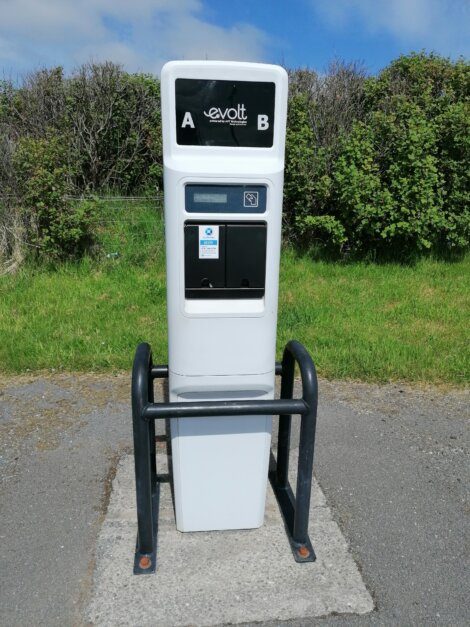Environment / Collaborate with supermarkets on electric vehicle chargers, councillor suggests
Meanwhile elected members have been updated on the constraints behind rolling out more electric vehicles
A COUNCILLOR has suggested collaborating with Shetland’s supermarkets to encourage them to look into the idea of installing rapid electric vehicle charge points in their car parks.
Green member Alex Armitage felt these could be useful locations for charge points as they are places that are busy with drivers.
But while environment and estate operations manager Carl Symons agreed they would be good locations, he warned that would come at a “considerable cost”, while there could also be grid constraints.
Meanwhile Shetland Islands Council’s environment and transport committee heard on Tuesday that there remains a number of obstacles to rolling out more electric vehicles in the local authority’s fleet.
This includes the initial capital outlay, which Symons said was the “biggest killer”.
The committee approved a capital maintenance and replacement programme for 2022/23, which includes a list of the vehicles due to by replaced by the council.
A report to members said the vehicles in the programme are largely diesel replacements.
“At present, the cost differential between electric/diesel small vans and cars would equate to an additional spend of over £2 million across the fleet of 157 vehicles,” it added.
“This is compounded by a lack of range and capability for electric vehicles, which would affect operational flexibility, further complicated by a lack of availability, charging infrastructure, and how we would recharge on-call/emergency vehicles.”
But Armitage said the transition to electric vehicles is going to come regardless and he pressed the council on introducing more electric vehicles.
“The more electric vehicles there are in Shetland the greater the momentum there is, the greater the pressure there is to build the infrastructure that we need to be able to operate and run these vehicles,” he said.
Symons explained that the council already has a number of electric vehicles in service, and is constantly looking at its options.
Become a member of Shetland News
He said one problem is staff like joiners, electricians and plumbers going home with their vans when they are on call for emergency jobs.
“If that’s an electric vehicle how do we charge that vehicle at night, how do we reimburse the employee for the cost of that charge?” Symons said.
He added that range and “range anxiety” are two of the main concerns.
However, the initial outlay on electric vehicles – as suggested by the £2 million figure – remains a key barrier.
One example was the cost of replacing a small road sweeper. Symons said a diesel model would cost £83,000, but an electric replacement would come with a price tag of more than £250,000 – and could only do two thirds of the functions.
The fact that grid-connected electric vehicle chargers are effectively being powered by Lerwick’s fuel power station is also mentioned in the report – although that will change once the Viking Energy and interconnector cable projects go live in 2024.
Symons said this “will to some extent stall our roll-out of electric vehicles”.
He also said that electric technology is not as readily available for larger vehicles like HGVs, although he did mention that new bin lorries ordered by the council have the ability to convert to hydrogen fuel.
Symons said things were akin to a “VHS versus Beta Max type argument” as to which direction things go when it comes to electricity and hydrogen.
On the matter of chargers, there are a number of public points dotted around Shetland – which are free to use – as well as ones hosted by organisations like the council, the NHS and Lerwick Port Authority.
Convener Andrea Manson asked when these may be rolled out to housing schemes.
Symons said the wider roll-out of chargers would be part of the outcomes resulting from a net zero route map exercise, which are due back soon.
But he highlighted the council has been using Transport Scotland funding for the charge points installed so far.
“At this moment in time we do not have a funded programme for putting in charge point infrastructure,” Symons said.
In relation to installing points in public areas Symons said the cost of an overnight charger could be around £2,500, but a rapid one could come with a price tag between £30,000 and £50,000.
“We face a number of problems in how we put in place the wider charging infrastructure,” Symons added.
Become a member of Shetland News
Shetland News is asking its many readers to consider paying for membership to get additional features and services: -
- Remove non-local ads;
- Bookmark posts to read later;
- Exclusive curated weekly newsletter;
- Hide membership messages;
- Comments open for discussion.
If you appreciate what we do and feel strongly about impartial local journalism, then please become a member of Shetland News by either making a single payment, or setting up a monthly, quarterly or yearly subscription.


















































































